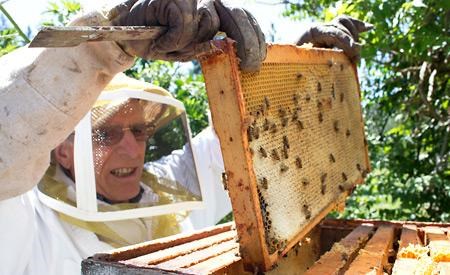For some people they’re cute, for others they’re terrifying and for a select few they’re an allergic death threat. But for Wilf Belanger, honeybees are his passion.
“I always did love bees,” said Belanger. “It’s amazing to see them work. They never went to university or college, but they all go about their duties.”
Belanger has been keeping bees since he was 13. After his father, a beekeeper with seven hives, was stung badly, Belanger had to take over his duties. “I said ‘no,’ but he told me what to do and what to look for,” he explained.
Many years later, the 69-year-old is now president of Powell River Beekeepers Association. He currently has one hive, but maintenance is still a commitment.
“You have to keep an eye on your bees all the time” said Belanger. “A good beekeeper will go in the hive and study them.” He visits his bees every morning, and looks for things that might be bothering the hive such as lack of food, overcrowding and environmental pollution.
Belanger also checks whether the queen is thriving. “Sometimes you have to replace her because she’s sick or injured,” he said.
Replacements are simple—the queen is removed and the hive creates a new one. Queen eggs go in special cups and are fed royal jelly. A new queen will mate for life and can lay up to 2,000 eggs a day.
“You do develop a bond, because they’re so interesting to watch,” said Belanger. “On a sunny day, when you watch the bees on the comb, it’s really very fascinating.”
Beekeeping, however, does have its drawbacks. “I’ve got stung lots, don’t ask me how many times,” Belanger said, laughing. He only used to dress in a beekeeping suit when he collected honey. After an incident where he was hospitalized twice within three days for two different bee stings, he started wearing gear more often.
“I like to look at my bees and just let them alight on my hand,” he said, “but when it’s time to go work with the bees, I’ll dress up.” Bee suits are light-coloured and smooth to differentiate them from bees’ natural predators such as bears and skunks.
Belanger also has to deal with the much debated mass disappearance of honeybees. Called colony collapse disorder, the phenomena is marked by commercial hives suddenly being abandoned—and has hit Belanger close to home. At the beginning of fall, Belanger had two thriving hives. By Christmas, both had disappeared. Belanger remained bee-less until, to his joy, a swarm unexpectedly moved in a month ago.
Why bees disappear is a bit of a mystery. Everything from power lines to electromagnetic fields produced by cell phones has been blamed. But Belanger and many experts agree part of the problem is pesticides. Certain types of pesticides, say experts, affect a bee’s built-in “GPS,” leaving it unable to find its way back to its hive.
Another problem is mites. “At one time, we just had our own local bees here, because no one could bring bees into Powell River,” Belanger explained. “Then, when the mites started moving in, they lifted the restrictions.”
Now, many types of bees are allowed in the area. Belanger has kept bees from New Zealand, Hawaii and Australia and not all honeybees are big and fuzzy. His current hive are small and dark, while others are longer or brighter.
Though some keep bees to pollinate their gardens, Belanger keeps bees mainly for the honey.
Hives are stacks of wooden boxes, each filled with wooden frames like a filing cabinet. Wax sheets on which the bees build their honeycombs are placed inside the frames.
Combs can be up to two centimetres thick, and are used to store honey, eggs and larvae. When combs are full of honey, they are capped off, preserving their contents for years.
To remove the honey, beekeepers take the wax sheets out, cut the caps off with a hot knife, and put the sheet in a special machine that extracts the honey using centrifugal force. One wax sheet weighs almost five kilograms when full of honey—a full bee box weighs in at almost 50 kilograms.
Results can be rich. Belanger remembered one year when he and a friend maintained 16 hives up near E Branch. “We pulled down more than a ton of honey that year,” he said.
Though Belanger has kept bees off and on over the years, he still sees it as his life’s passion. When asked how long he would keep beekeeping, he laughed and said, “As long as I can walk and lift those heavy boxes.”



